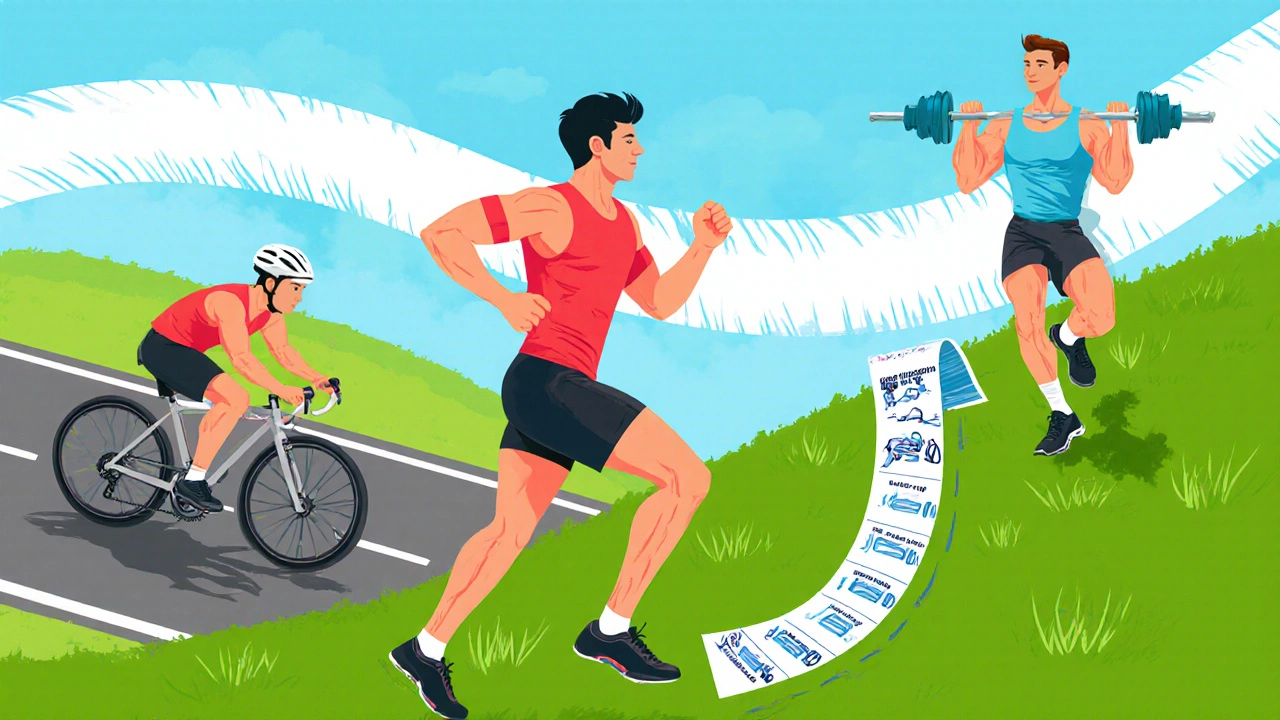Marathon at 30: Is Age a Barrier?

Marathon Training Plan Calculator
Create Your Training Plan
When you wonder if Marathon is a race you can tackle at 30, the answer is surprisingly simple: age alone isn’t a deal‑breaker. What matters is how you train, recover, and listen to your body.
Key Takeaways
- Being 30 is not too old to start marathon training.
- Gradual mileage increase and injury‑prevention are essential.
- Customize your plan to current fitness and recovery speed.
- Nutrition, sleep, and cross‑training boost performance.
- Set realistic goals and enjoy the process.
How Age Affects Endurance
Age is often linked to slower recovery and a higher injury risk, but the science shows that a 30‑year‑old body still has plenty of plasticity. A 2022 study from the University of Oxford tracked 1,200 runners aged 20‑45 and found no significant drop in VO2 max until after the mid‑40s, provided training volume stayed consistent.
At 30, you’re typically past the late‑teen growth phase but before the natural decline in muscle mass that accelerates after 40. That means you can still build aerobic capacity and strength, especially if you respect the principles of progressive overload.
Designing a Safe Training Plan
The first step is a Training Plan that matches your current mileage, time constraints, and injury history. Here’s a simple 16‑week outline for a beginner‑to‑intermediate 30‑year‑old:
- Weeks 1‑4: Establish a base of 15‑20 miles per week, with one long run of 8‑10 miles.
- Weeks 5‑8: Add 10% mileage each week, introduce a mid‑week tempo run (4‑5 miles at half‑marathon pace).
- Weeks 9‑12: Incorporate a cut‑back week every fourth week, and start weekly hill repeats to boost strength.
- Weeks 13‑15: Peak mileage (40‑45 miles per week) with a longest run of 20 miles three weeks before race day.
- Week 16: Taper - reduce mileage by 40% and focus on short, easy runs.
Notice the built‑in recovery weeks; they’re crucial for a 30‑year‑old whose connective tissue isn’t as forgiving as a teenager’s.
Injury Prevention and Recovery Strategies
Injury risk spikes when mileage jumps too fast. The "10% rule" (no more than a 10% weekly increase) is a practical guardrail. Also, monitor VO2 Max trends - a sudden drop often signals overtraining.
Key recovery tactics:
- Sleep: Aim for 7‑9 hours; deep sleep spikes growth‑hormone release, aiding tissue repair.
- Foam rolling and dynamic stretching after each run to keep fascia supple.
- Strength work twice a week - squats, deadlifts, and core glutes work reduce knee stress.
- Ice baths or contrast showers for intense long runs.
When a niggle appears, the Recovery protocol should include a brief reduction in mileage, targeted physiotherapy, and a focus on nutrition.

Fueling Your Body
Nutrition is the silent performance driver. A 30‑year‑old marathoner benefits from a balanced carb‑protein‑fat ratio: roughly 55% carbs, 25% protein, 20% fat for daily meals.
During long runs, aim for 30‑60 grams of carbs per hour - think a banana + a sports drink or an energy gel. Post‑run, a 3:1 carb‑protein snack (e.g., chocolate milk) jump‑starts glycogen refill and muscle repair.
Cross‑Training and Heart‑Rate Zones
Running isn’t the only way to build endurance. Cross Training like cycling, swimming, or rowing protects joints while enhancing aerobic capacity.
Use heart‑rate zones to gauge effort. For most 30‑year‑old runners, Zone 2 (60‑70% of max HR) is the sweet spot for long runs, while Zone 4 (80‑90%) is reserved for interval work.
Real‑World Success Stories
Emily, a 30‑year‑old software engineer from Bristol, started running at 28 with no prior distance experience. She followed a 16‑week plan similar to the one above, added two weekly yoga sessions for flexibility, and completed her first marathon in 4:10. She credits consistent weekly mileage and a strict sleep schedule for staying injury‑free.
Mark, a 33‑year‑old teacher, used a hybrid approach: three run days, two bike days, and one strength day. He finished his debut marathon with a personal best of 3:45, proving that diversified training can shave minutes off the clock.

Putting It All Together
If you’re 30 and wondering whether to lace up for a marathon, the answer hinges on three pillars: gradual training, smart recovery, and proper fueling. Follow a structured plan, listen to your body, and don’t skip the cross‑training and strength work. With these basics, age becomes a number, not a barrier.
Quick Comparison of Weekly Mileage
| Training Phase | 30‑Year‑Old (miles) | 45‑Year‑Old (miles) |
|---|---|---|
| Base (Weeks 1‑4) | 15‑20 | 12‑16 |
| Build (Weeks 5‑12) | 25‑35 | 20‑28 |
| Peak (Weeks 13‑15) | 40‑45 | 30‑35 |
| Taper (Week 16) | 20‑25 | 15‑20 |
Notice the slightly lower mileage ceiling for older runners. Adjust the numbers to suit your own fitness level, but keep the 10% weekly increase rule.
Frequently Asked Questions
Can I start marathon training at 30 if I’ve never run more than 5k?
Yes. Begin with a run‑walk program, gradually increasing the running portion each week. Aim for a 10‑minute run by week three and build from there. Consistency beats speed at the start.
How many rest days should a 30‑year‑old include?
At least one full rest day and one easy‑run day per week. Recovery can also be active, like a light bike ride or yoga session.
Is cross‑training essential for marathon success?
It’s highly recommended. Low‑impact activities reduce joint stress, improve overall cardio, and keep training fresh. Even one 45‑minute swim per week can make a difference.
What’s a realistic finish time for a first‑time marathoner at 30?
Most beginners finish between 4 hours and 5 hours, depending on prior fitness. Setting a time‑goal of 4:30 is attainable for many with consistent training.
Should I do strength training alongside my runs?
Definitely. Two sessions per week focusing on squats, lunges, deadlifts and core work lower injury risk and improve running economy.
Ready to start? Keep the plan steady, fuel right, and trust that 30 is a perfect age to chase that marathon finish line.
